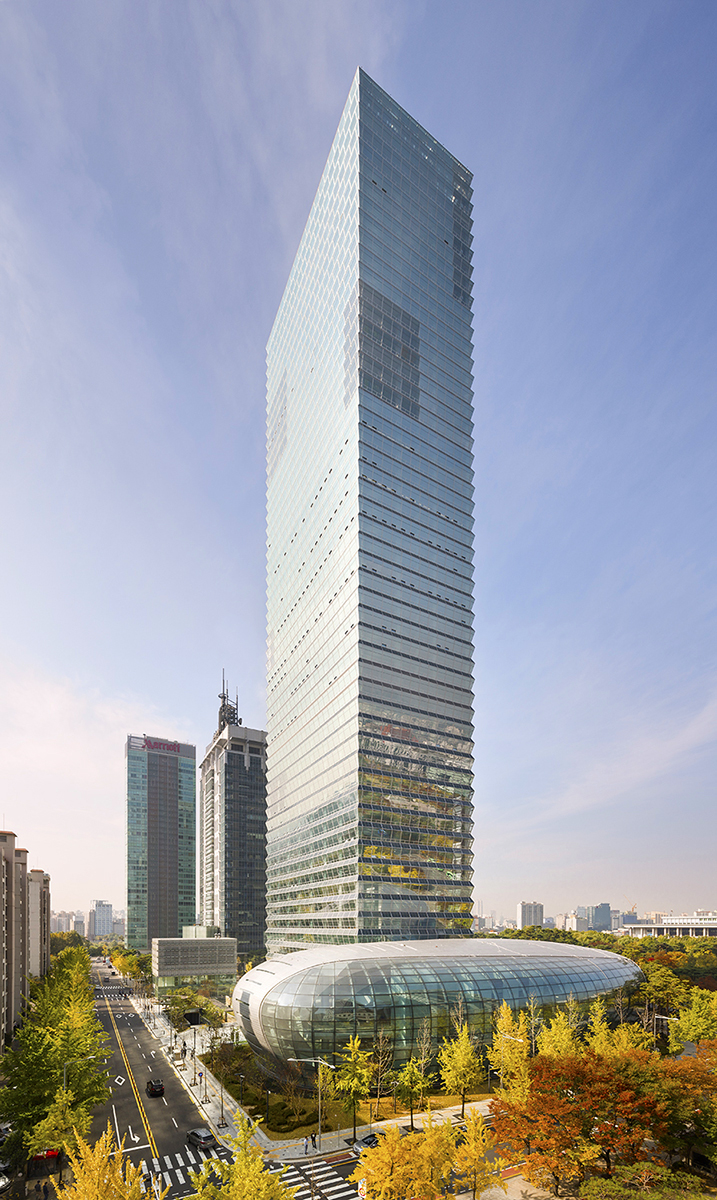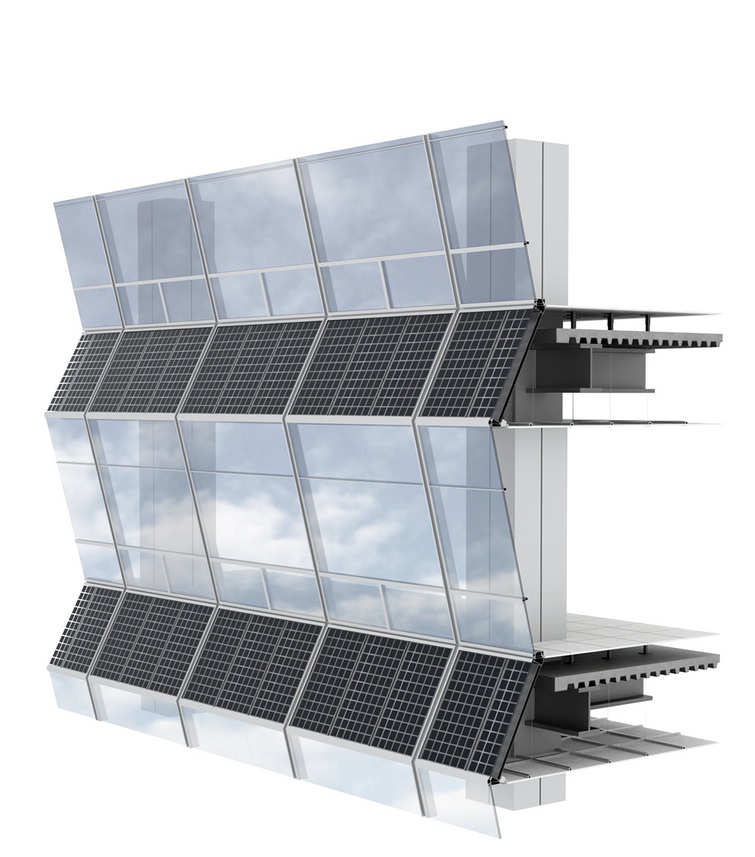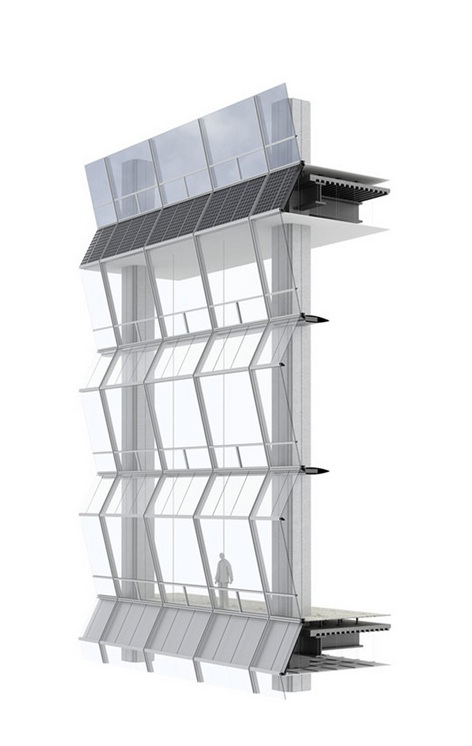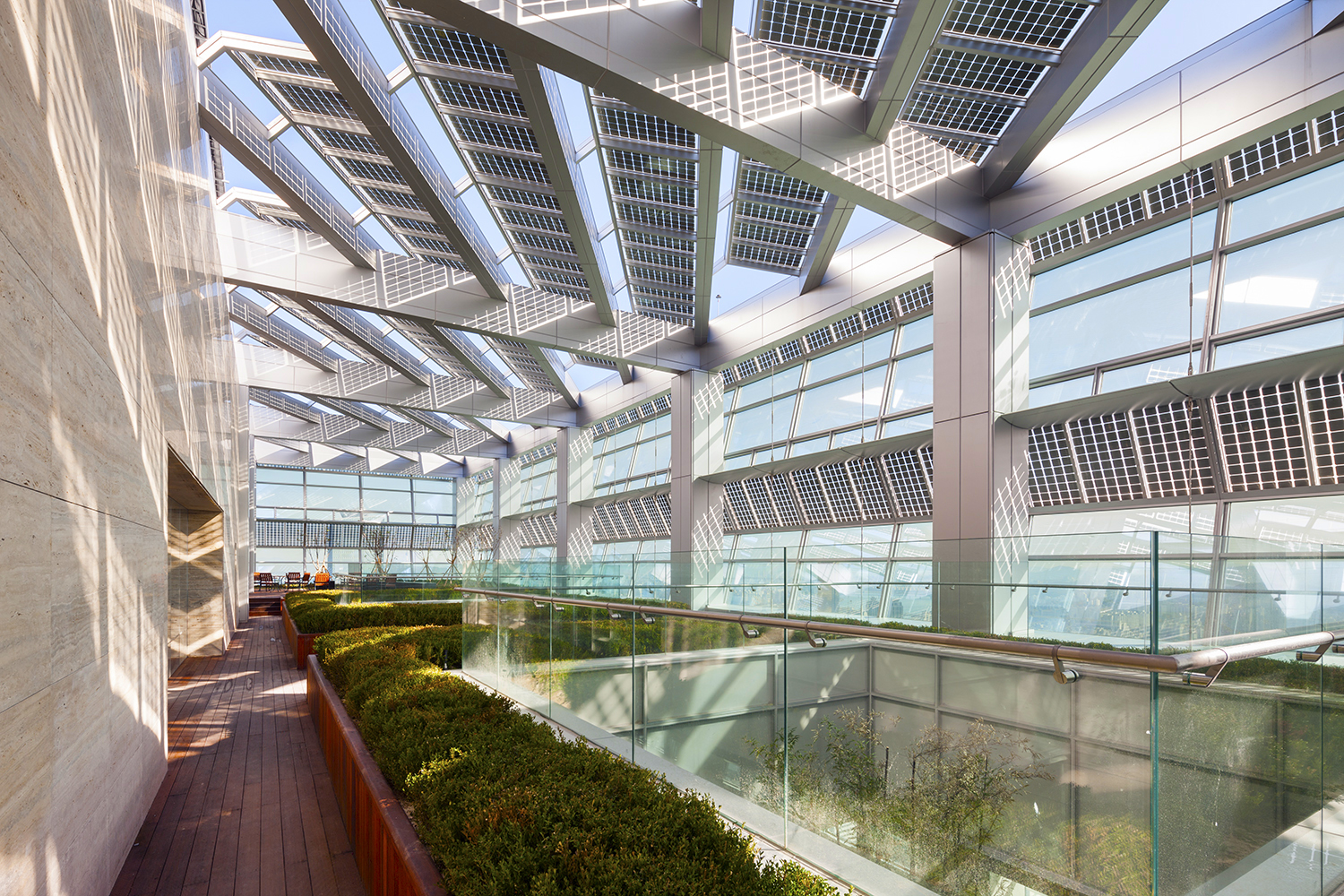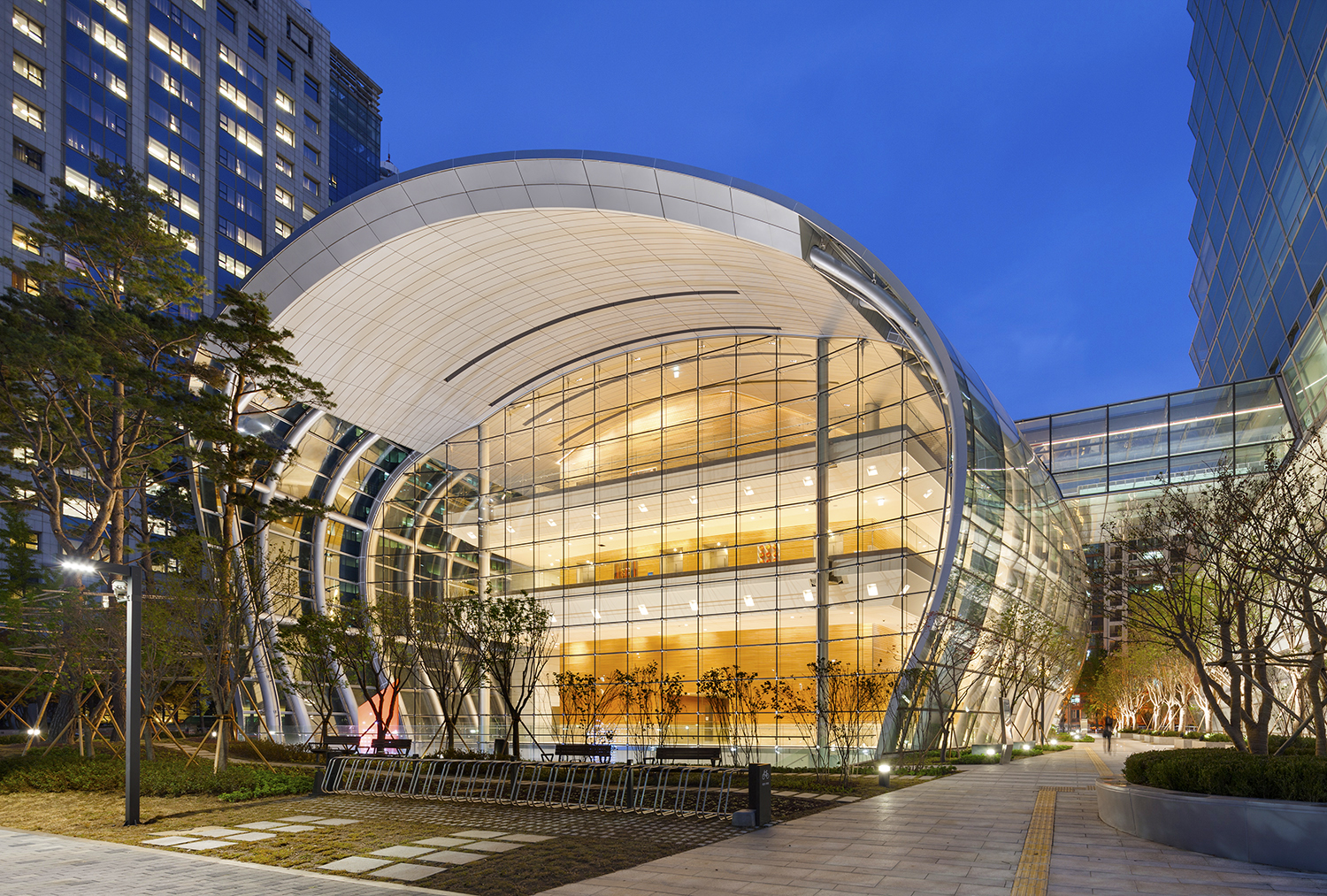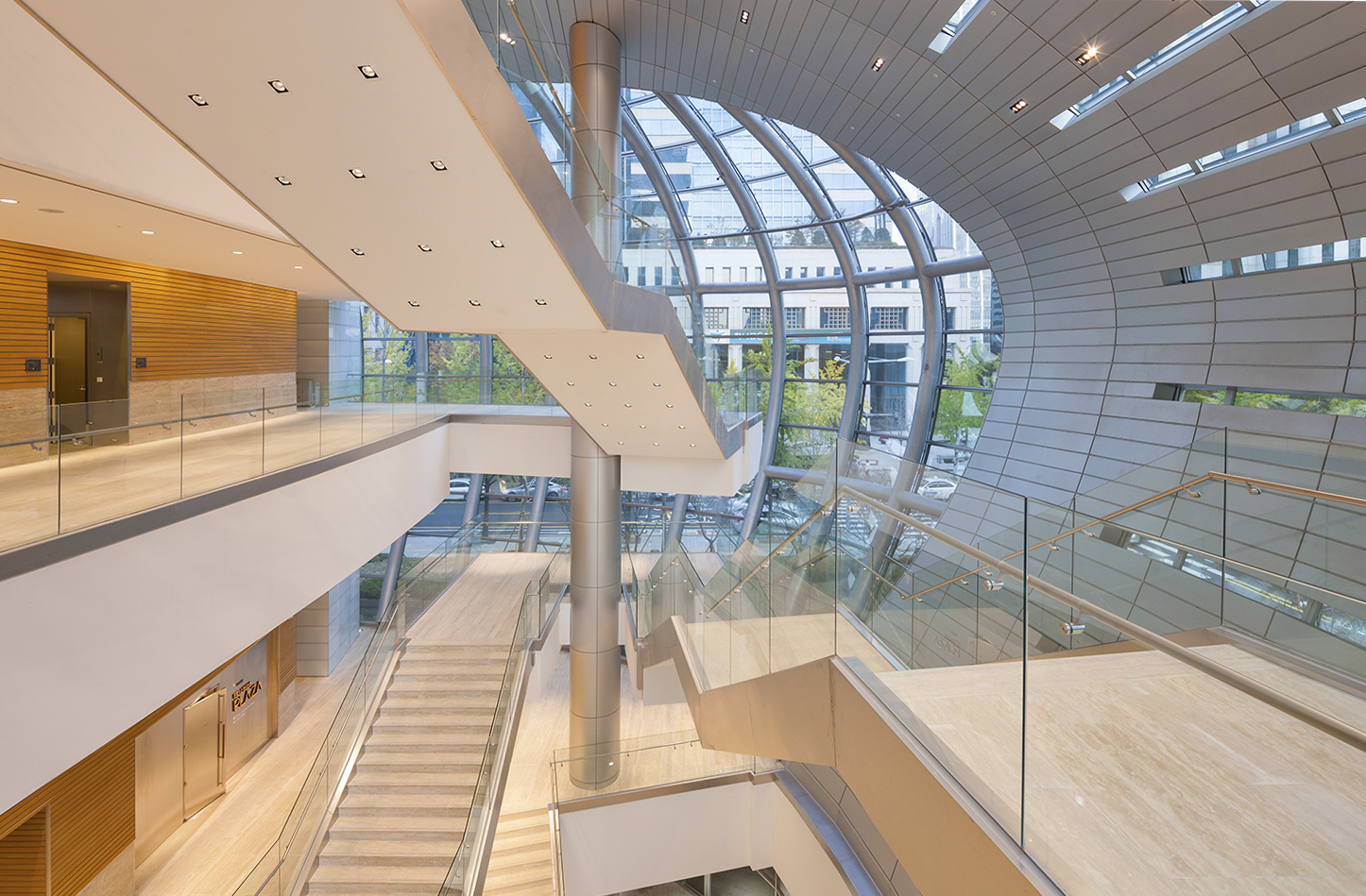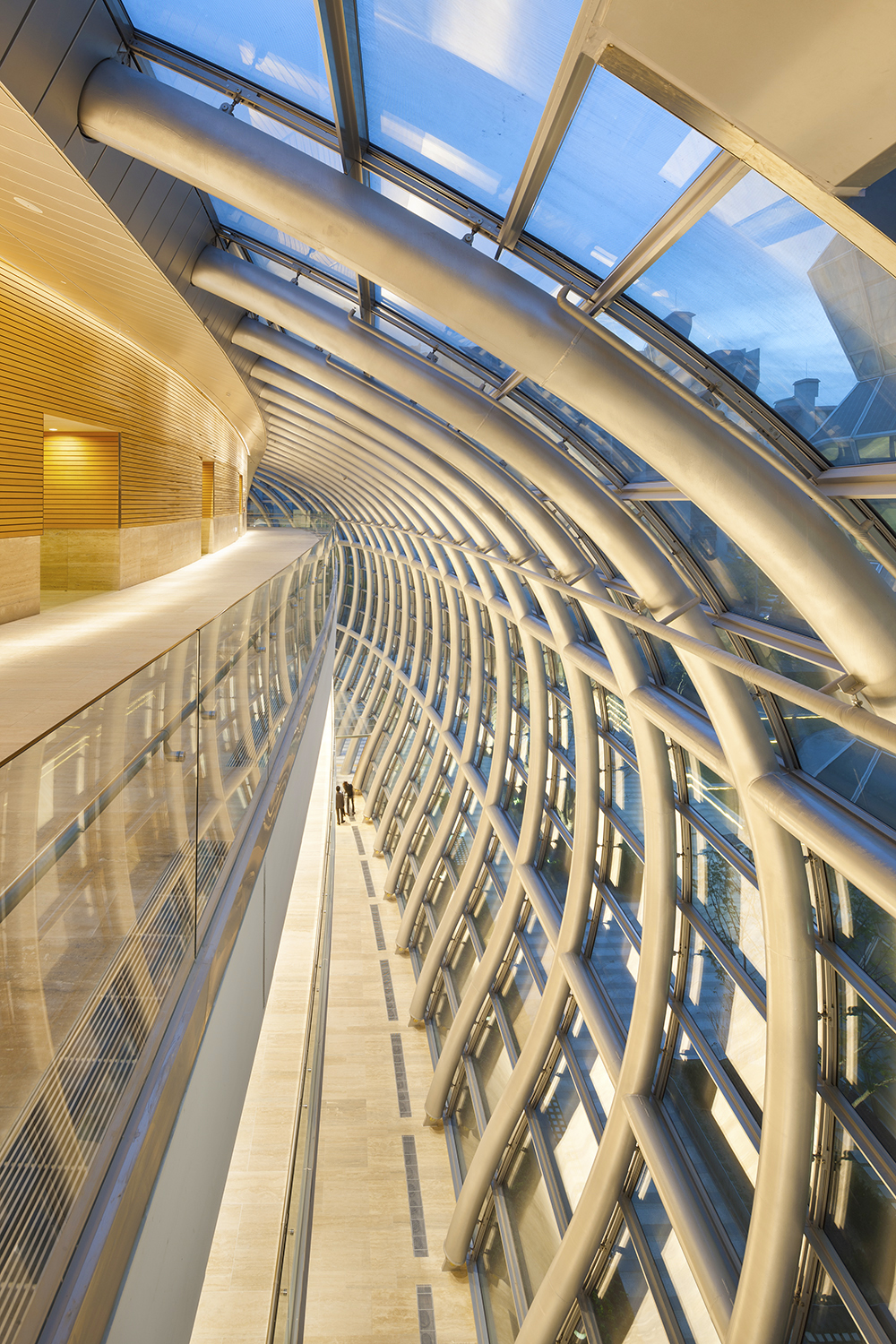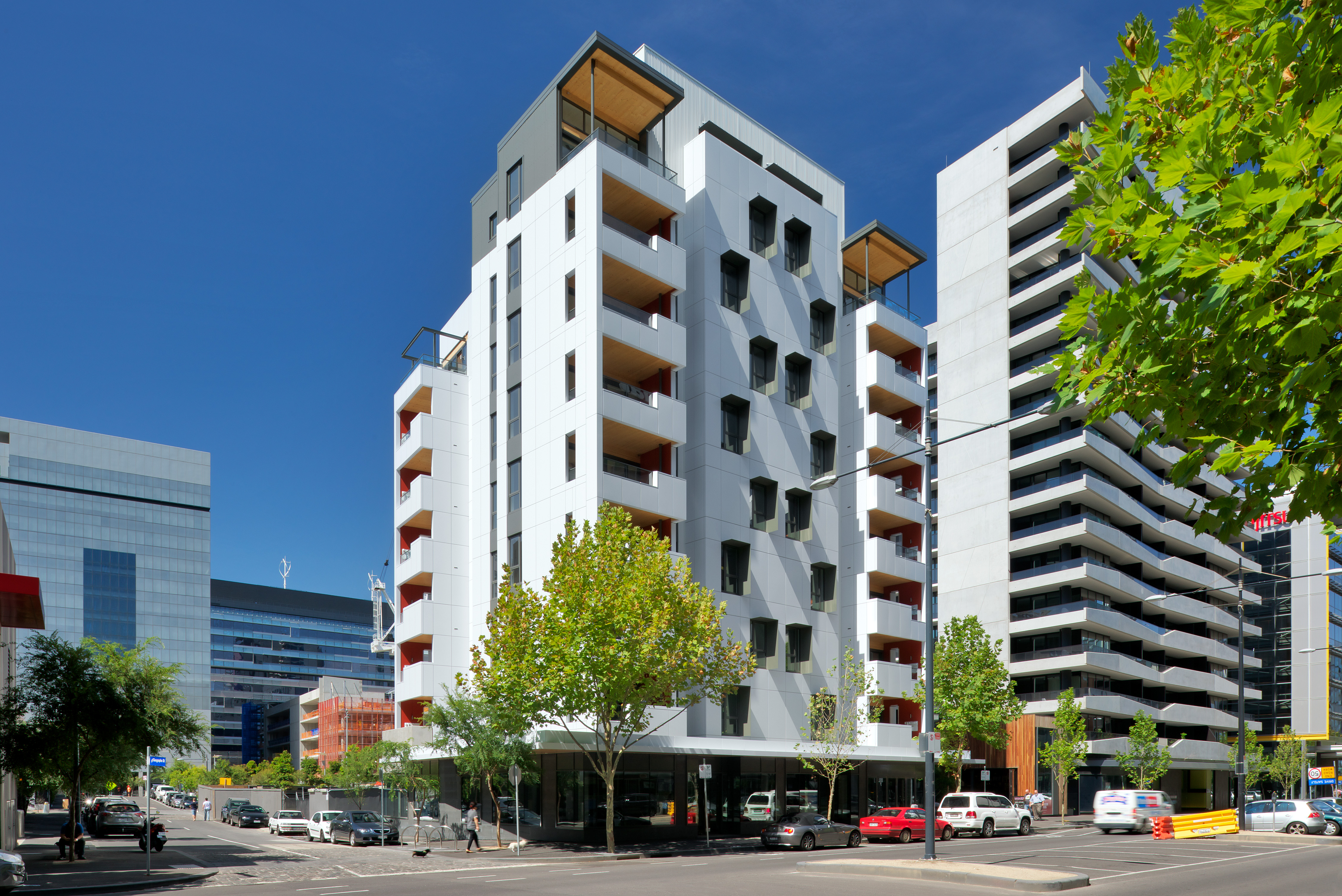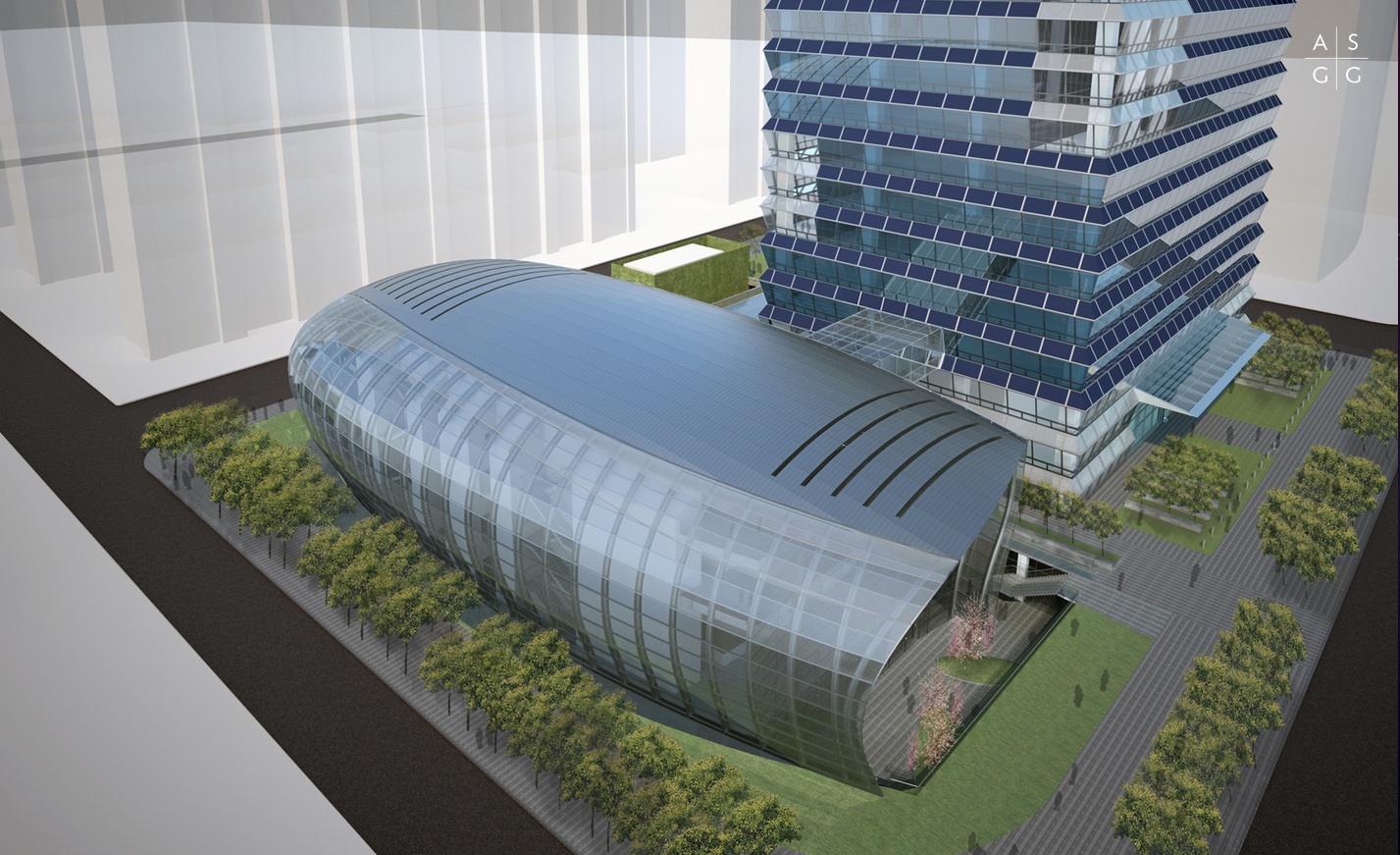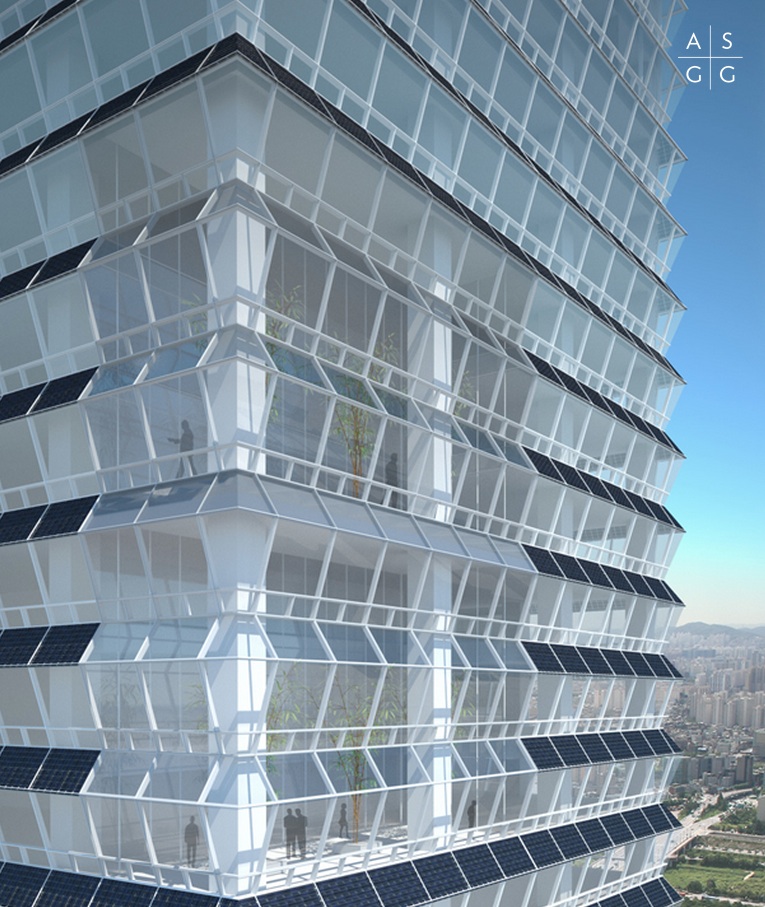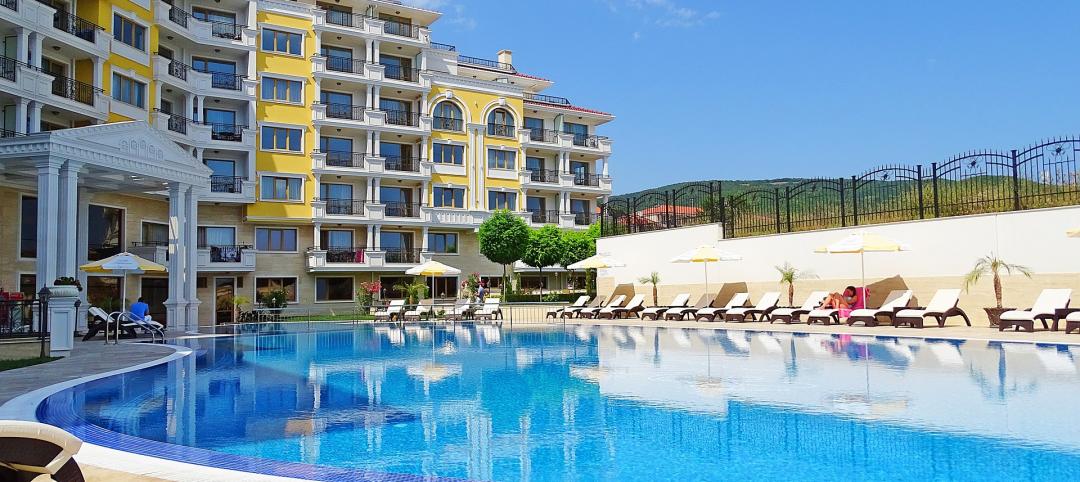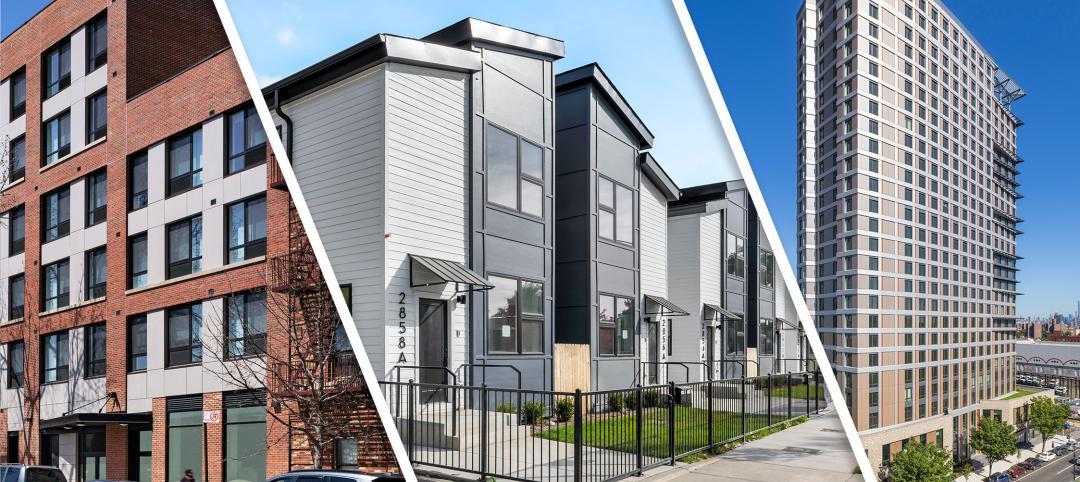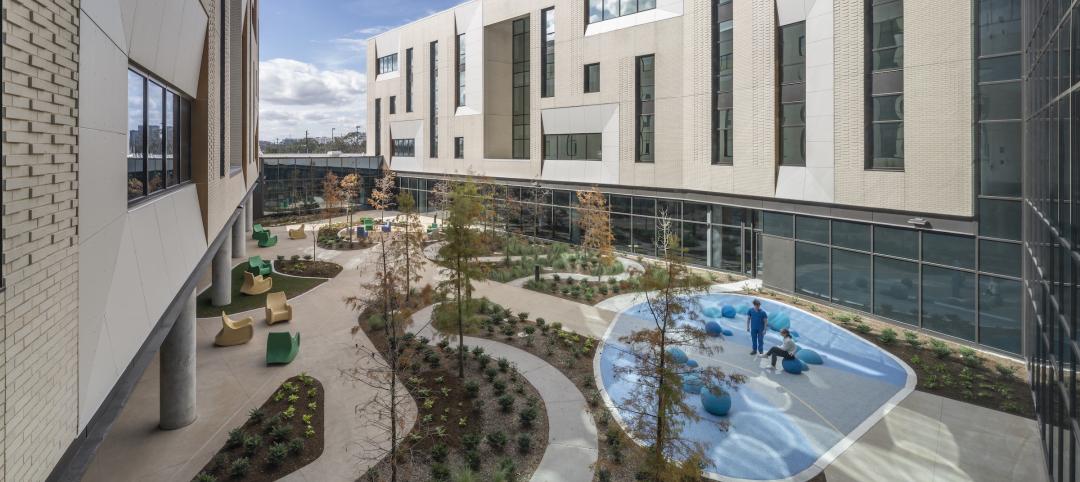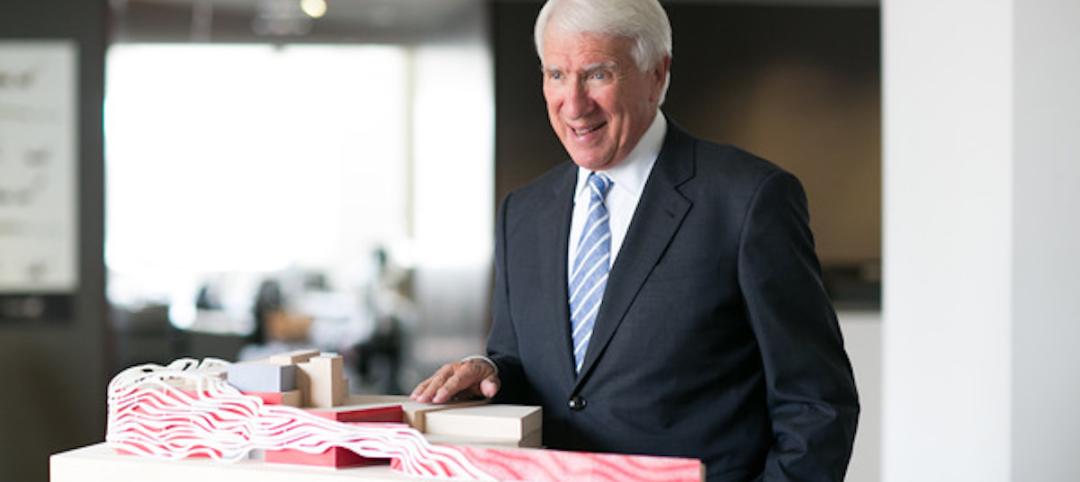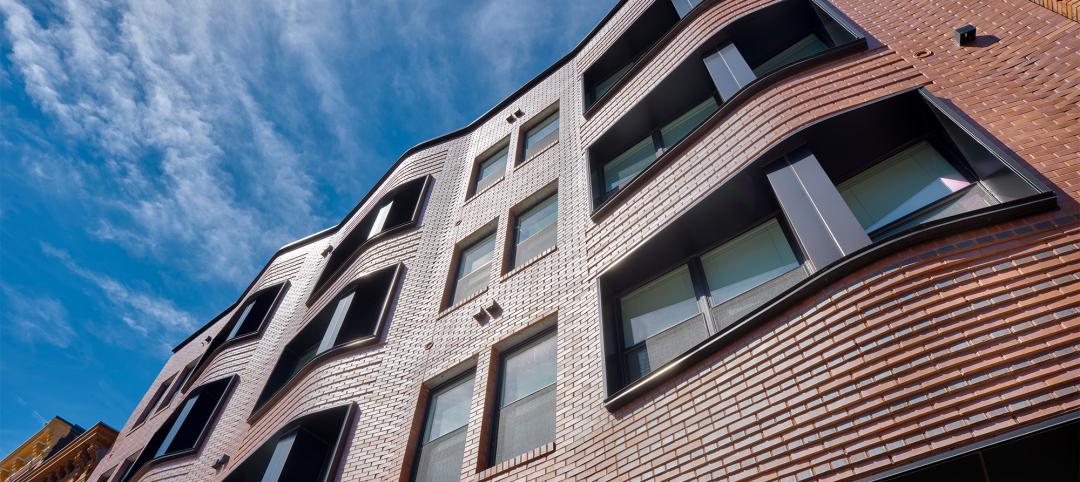Adrian Smith + Gordon Gill Architecture (AS+GG) has announced the public opening of the new head offices for the Federation of Korean Industries (FKI).
"FKI Headquarters represents a new exterior wall typology that both integrates significant quantities of photo voltaic panels into the exterior wall and slopes the vision glass at an angle that generates self-shading and allowing less reflective glass to be used. The result is a unique folded exterior texture that is both purposeful and distinctive" says Adrian Smith.
The 50-story, 240-meter tower features an innovative exterior wall, designed specifically for the project. The building’s unique skin will help reduce the internal heating and cooling loads and collect energy through photovoltaic panels that are integrated into the spandrel areas of the southwest and northwest facades.
By angling the spandrel panels 30 degrees upward toward the sun, the design is able to maximize the amount of energy collected, generating enough power to help maintain the electrical systems throughout the tower core and the office spaces.
Just below the spandrel panels, the vision panels are angled 15 degrees downward toward the ground, minimizing the amount of direct sun radiation and glare. Together, the alternating spandrel and vision panels create a dynamically rippled façade that is both environmentally progressive and visually striking, giving the tower a unique architectural presence on the skyline.
The interior of the building takes advantage of the floor to ceiling windows of the exterior wall, offering an abundance of natural light to office spaces and corridors as well as extensive views of neighboring Yeoido Park, the Han River and the surrounding city of Seoul.
The completed tower includes several indoor garden/atrium spaces that enhance the workplace environment with natural elements of wood, bamboo and other native plants. The roof top atrium space features more custom photovoltaic panels.
“The ideal angle of the PV panel placement on the roof was studied in detail,” says Gordon Gill, “In a relatively unconfined space, PVs would normally be angled upward at 30 degrees but within the limited area of the roof, we determined that a 10-degree angle allowed for more panels to be installed closer together, minimizing the effect of the panels casting shadows on each other and ultimately producing more solar energy for the building.”
AS+GG Partner Robert Forest adds, “The tower features one of the most efficient solar electric facades in the world in a cost effective manner, proactively expanding Korea's goal of advancing renewable energy generation in buildings.”
The sculptural podium piece is located on central Yeoi-Dae-Ro Avenue, further promoting the tower’s public identity. The podium amenities, available for public use include a banquet hall, central restaurant and conference center.
The podium will be available for international conferences with a large first floor banquet hall and smaller conference rooms of various sizes located on the second and third floors. The multi-purpose nature of the podium is another way that the FKI building will become a new city centerpiece for Seoul.
AS+GG collaborated with the engineering firms Thornton Tomasetti and Environmental Systems Design, as well as the local firm Chang-Jo Architects, on the project.
The Building Team included:
Adrian Smith + Gordon Gill Architecture (AS+GG) is dedicated to the design of high-performance architecture in a wide range of typology and scale, from low- and mid-rise residential, commercial and cultural buildings to mixed-use supertall towers and new cities. The office uses a holistic, integrated design approach that explores symbiotic relationships with the natural environment. AS+GG is currently working on projects for clients in the United Arab Emirates, Saudi Arabia, China, and the United States. The partnership was founded in 2006 by Adrian Smith, Gordon Gill and Robert Forest. For more information, please visit www.smithgill.com.
Thornton Tomasetti provides engineering services to clients worldwide on projects of all sizes and complexity. Thornton Tomasetti is responsible for the structural design of some of the world’s tallest buildings, including the Petronas Towers, Taipei 101, Ping An International Finance Center in China and Federation Tower in Russia. The firm is committed to creating the best structural solutions through technical ingenuity, pursuit of excellence and responsiveness to client needs. Thornton Tomasetti has offices across the United States and in Asia, Europe and the Middle East. For more information, please visit www.ThorntonTomasetti.com.
Environmental Systems Design, Inc. (ESD) has provided engineering design solutions on thousands of buildings in the United States and throughout the world. With over 220 engineering and design professionals, ESD is one of the largest consulting engineering firms in the Midwest. ESD offers consulting engineering design services in mechanical, electrical, plumbing, fire protection, LEED, sustainable design, commissioning, and technology. ESD supports a diverse range of markets including commercial, health and science, education, mission critical, residential, assembly, cultural, theaters, energy plants, transportation and international. For more information, please visit www.esdesign.com.
Since 1984, Chang-jo Architects has been one of the leading professional architectural firms in Korea, providing total and comprehensive design services in architectural design, urban planning, landscape design, engineering and construction management. By possessing such an integrated core of services, they deliver to their clients the best service and value through intelligent design and advanced technology. Learn more about Chang-jo Architects at www.cja.co.kr.
Related Stories
Multifamily Housing | Mar 14, 2023
Multifamily housing rent rates remain flat in February 2023
Multifamily housing asking rents remained the same for a second straight month in February 2023, at a national average rate of $1,702, according to the new National Multifamily Report from Yardi Matrix. As the economy continues to adjust in the post-pandemic period, year-over-year growth continued its ongoing decline.
Affordable Housing | Mar 14, 2023
3 affordable housing projects that overcame building obstacles
These three developments faced certain obstacles during their building processes—from surrounding noise suppression to construction methodology.
Healthcare Facilities | Mar 13, 2023
Next-gen behavioral health facilities use design innovation as part of the treatment
An exponential increase in mental illness incidences triggers new behavioral health facilities whose design is part of the treatment.
Student Housing | Mar 13, 2023
University of Oklahoma, Missouri S&T add storm-safe spaces in student housing buildings for tornado protection
More universities are incorporating reinforced rooms in student housing designs to provide an extra layer of protection for students. Storm shelters have been included in recent KWK Architects-designed university projects in the Great Plains where there is a high incidence of tornadoes. Projects include Headington and Dunham Residential Colleges at the University of Oklahoma and the University Commons residential complex at Missouri S&T.
Mixed-Use | Mar 11, 2023
Austin mixed-use development will provide two million sf of office, retail, and residential space
In Austin, Texas, the seven-building East Riverside Gateway complex will provide a mixed-use community next to the city’s planned Blue Line light rail, which will connect the Austin Bergstrom International Airport with downtown Austin. Planned and designed by Steinberg Hart, the development will include over 2 million sf of office, retail, and residential space, as well as amenities, such as a large park, that are intended to draw tech workers and young families.
Performing Arts Centers | Mar 9, 2023
Two performing arts centers expand New York’s cultural cachet
A performing arts center under construction and the adaptive reuse for another center emphasize flexibility.
Architects | Mar 9, 2023
HLW achieves Just 2.0 label for equity and social justice
Global architecture, design, and planning firm HLW has achieved The International Living Future Institute’s (ILFI) Just 2.0 Label. The label was developed for organizations to evaluate themselves through a social justice and equity lens.
Architects | Mar 9, 2023
A. Eugene (Gene) Kohn, Co-Founder of Kohn Pedersen Fox, dies at 92
A. Eugene (Gene) Kohn, FAIA RIBA JIA, Co-founder of international architecture firm Kohn Pedersen Fox, died today of cancer. He was 92.
Affordable Housing | Mar 8, 2023
7 affordable housing developments built near historic districts, community ties
While some new multifamily developments strive for modernity, others choose to retain historic aesthetics.
Architects | Mar 8, 2023
Is Zoom zapping your zip? Here are two strategies to help creative teams do their best work
Collaborating virtually requires a person to filter out the periphery of their field of vision and focus on the glow of the screen. Zoom fatigue is a well-documented result of our over-reliance on one method of communication to work. We need time for focus work but working in isolation limits creative outcomes and innovations that come from in-person collaboration, write GBBN's Eric Puryear, AIA, and Mandy Woltjer.


